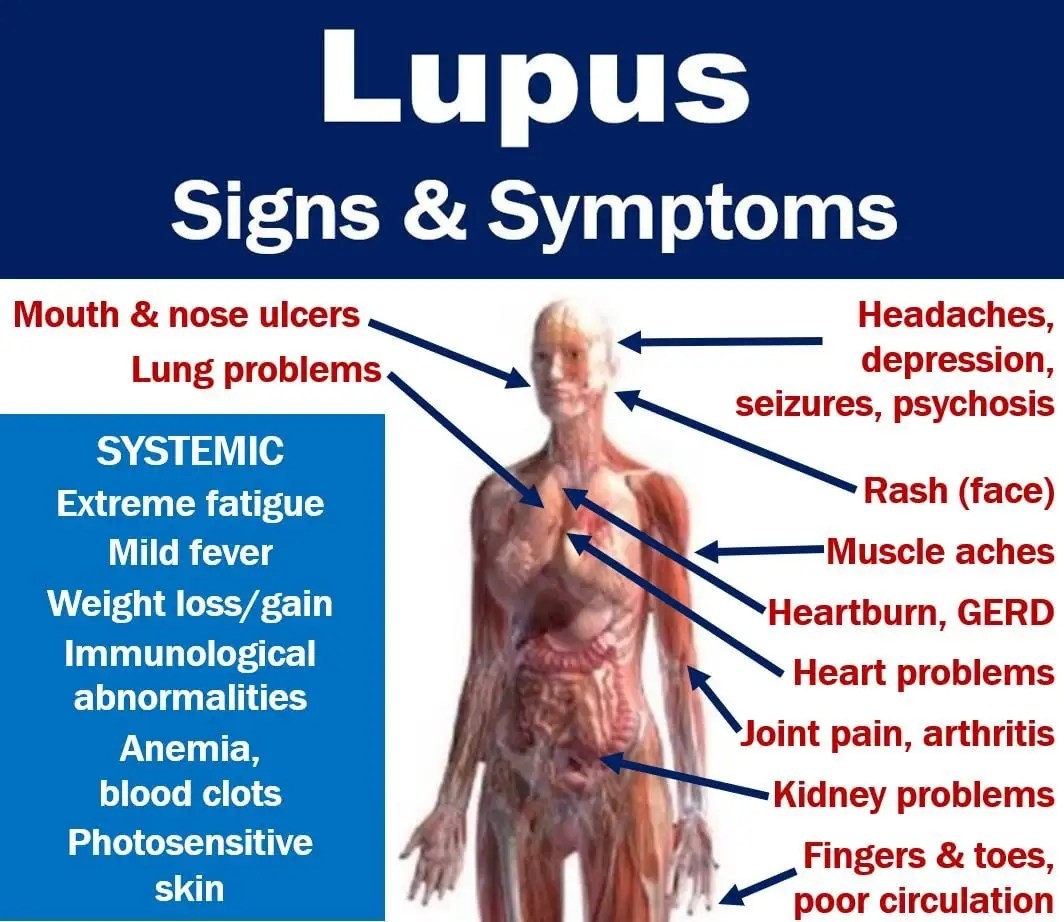
Contents
What Happens When You Have Lupus?
Lupus is an autoimmune disease that occurs when your immune system attacks your own tissues and organs, resulting in these 12 common symptoms.
Lupus is an autoimmune disease, meaning your immune system dysregulates itself and attacks your own organs.
Lupus symptoms vary and can range from mild to life-threatening.
The 12 common symptoms of lupus include:
- Joint and muscle pain or swelling
- Prolonged fatigue
- Low-grade fever of unknown origin
- Skin rash, often on the face (called the “butterfly rash”)
- Fingers and toes that turn white or blue in cold or during stressful periods (Raynaud’s phenomenon)
- Shortness of breath
- Dry eyes, eye rash, and iritis (eye pain)
- Headache, confusion, or memory loss
- Chest pain
- Unusual hair loss
- Anemia
- Sensitivity to sunlight
What parts of the body does lupus affect?
Lupus can affect many parts of your body and lead to complications.
Inflammation caused by lupus can affect the following organs:
- Kidneys: Lupus can severely damage the kidneys, and kidney failure is a leading cause of death in people with lupus. Symptoms include inability to pass urine, frothy urine, facial edema, nausea, vomiting, leg swelling or edema. Lupus can also cause headaches, dizziness, behavioral changes, hallucinations, strokes, seizures, and memory problems.
- Lupus can cause blood issues such as anemia, increased risk of bleeding or blood clotting, and vasculitis (blood vessel inflammation).
- Lupus increases your risk of pleurisy (inflammation of the lining of the chest cavity) and pneumonia.
- Lupus can inflame the heart muscle, arteries, or heart membrane (pericarditis), increasing the risk of cardiovascular disease and heart attack.
IMAGES
What does lupus increase your risk of?
Lupus increases your risk of infection and cancer, although the risk is relatively small.
Lupus also increases your risk of:
- Osteonecrosis: bone damage due to decreased blood supply.
- Infertility, miscarriage, preterm birth, and high blood pressure during pregnancy. Pregnancy should be deferred until the disease has been under control for at least six months to reduce the risk of complications.
Diagnosing lupus can be challenging due to the variability of signs and symptoms. The diagnosis is based on blood and urine tests, signs and symptoms, and physical examination findings.
2 types of lupus
There are two types of lupus with significant differences in symptoms:
- Systemic lupus erythematosus (SLE): The disease is characterized by flare-ups and remissions. It can affect any organ or system of the body, although most people with lupus are only affected by the skin and joints. SLE may also affect the kidneys, lungs, heart, blood vessels, and/or brain.
- Discoid lupus (chronic cutaneous lupus erythematosus): This type manifests as a red scaly rash on sun-exposed areas of the body. Most people with discoid lupus have only skin symptoms, but a small percentage may develop SLE.
Other milder forms of lupus include subacute cutaneous lupus, which is typically a transient form of lupus triggered by certain medications, and lupus drug-induced by certain drugs.
What is the cause of lupus?
Lupus has no known cause, but it is believed to be a combination of genetic and environmental factors that contribute to the formation of antibodies causing the disease. Environmental triggers can include sun exposure, infections, and certain medications.
Factors that may increase your risk of lupus include being female, aged between 15 and 45 years, and belonging to African American, Hispanic, or Asian American ethnicities.
5 treatment options for lupus
Treatment for lupus depends on your signs and symptoms. It is important to discuss the benefits and risks of different medications with your doctor. Medications may need to be adjusted as your symptoms fluctuate.
The most commonly used medications for lupus treatment are:
- Nonsteroidal anti-inflammatory drugs (NSAIDs): Over-the-counter or prescription NSAIDs can be used to alleviate pain, swelling, and fever associated with lupus.
- Antimalarial drugs: These medications modify the immune system and help reduce the risk of lupus flare-ups. Regular eye exams are necessary when taking these drugs.
- Corticosteroids: Prednisone and other corticosteroids reduce inflammation in lupus. Higher doses may be used for serious kidney and brain disease, but long-term use increases the risk of side effects.
- Immunosuppressants: Immunosuppressive drugs are used in severe cases of lupus to suppress the immune system.
- Biologics: Intravenously administered medications that can alleviate lupus symptoms in some individuals.
What are the side effects of lupus medication?
- NSAIDs can cause stomach bleeding, kidney problems, and an increased risk of heart problems.
- Antimalarial drugs may cause stomach upset and, rarely, retinal damage.
- Corticosteroids can lead to weight gain, easy bruising, thinning bones, high blood pressure, diabetes, and an increased risk of infection.
- Immunosuppressants increase the risk of infection, liver damage, decreased fertility, and cancer.
- Biologic drugs may cause nausea, diarrhea, infections, and rarely, depression.
If you have lupus, taking care of your body is important. Simple precautions can help prevent flare-ups and manage symptoms effectively. Regular checkups with your doctor can help prevent flare-ups and address routine health concerns. Stress management, a healthy diet, and regular exercise can also help prevent lupus complications.
The availability of better medications has improved the outlook for people with lupus. Seeking medical attention as soon as possible makes a significant difference as delays in treatment can result in organ failure and death.
By clicking Submit, I agree to MedicineNet’s Terms & Conditions & Privacy Policy and understand that I may opt out of MedicineNet’s subscriptions at any time.


